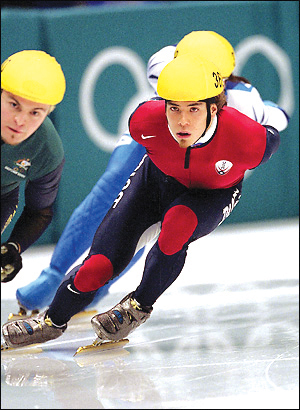
Apolo Anton Ohno won his sixth Olympic medal, breaking a record set by Bonnie Blair. Can he get another in 2010? (Photo provided by www.apoloantonohno.com)
By Paul Newberry
The Associated Press
VANCOUVER, British Columbia (AP) — Boxed out by the South Koreans, with all hope of a medal appearing lost, Apolo Anton Ohno could only count on the freakishness of short track to pull it out.
When two skaters ahead of him went sliding into the padding, Ohno stuck his skate across the line and Olympic medal No. 6 was his.
The American pulled out a silver in the 1,500-meter final when two South Koreans took each other out on the final turn, allowing Ohno to tie Bonnie Blair for most medals won by a U.S. Winter Olympian.
Korea still got the gold, which went to Lee Jung-su, out front and out of the trouble that gobbled up his teammates. But Ohno had no complaints about being the runner-up, especially when he was fourth with just a few meters to go. It didn’t hurt to see 19-year-old American teammate J.R. Celski right behind him, taking bronze in his first major event since a gruesome crash at the U.S. trials.
“That last two laps was pretty intense. There was a lot of bumping, a lot of contact,” Ohno said. “This is what this sport is all about.”
Ohno, who now has two medals of each color, moved past Eric Heiden as the most decorated American male at the Winter Games and also claimed the mark for most short track medals since the wild-and-wooly sport joined the Olympic program in 1992.
Heiden, now the team doctor for U.S. Speedskating, told The Associated Press he was “glued to the television” while working in the training room at the Olympic Village.
“The thing that really sets him apart is he’s been doing this for a number of years,” Heiden said when he was reached on his cell phone. “We’ve learned to appreciate what dedication and hard work he’s had to put in. He’s a product of both those things.”
Ohno grabbed an American flag, though he had to put it under one arm when he held up his fingers for the crowd — all five on the left hand and another on the right.
“I’ve come prepared, more than I’ve ever prepared for anything in my life,” Ohno said. “I’m in a very, very good place. Obviously, I know I have six medals now and I have no regrets about this entire Olympic Games experience. This is going to stay with me for the rest of my life.”
Ohno eliminated Canadian favorite Charles Hamelin in the semifinals with a daring inside move, drawing groans from many of the red-clad fans in the packed house of 14,200 at Pacific Coliseum. But there was still plenty of red-white-and-blue cheering for the 27-year-old American, who is practically a hometown favorite at these games.
Vancouver is just a three-hour drive north of suburban Seattle, where Ohno was born and raised by a single father, getting his start in skating with wheels under his feet, rather than blades.
“I just feel so blessed to be here, healthy, competing,” he said. “It feels like home soil to me. We just have so much support in the crowd.”
When he saw Olympic short track for the first time on TV, Ohno decided that that’s what he wanted to do.
Clearly, the ice suited him just fine.
No sport is more unpredictable than short track, either.
Ohno won his first medal at the 2002 Salt Lake City Games when a crash on the final turn took out every skater but one, Australia’s Steven Bradbury, who coasted across the line as perhaps the flukiest gold medalist ever. Ohno, his leg gashed by a skate blade, crawled across the line for a silver.
Ohno’s sixth medal was claimed under similar circumstances, though this time, he didn’t have to spill any blood. The powerful South Koreans put three skaters in the final, and it looked as though they would sweep the medals when all of them shot ahead of Ohno on the final lap.
“Myself and everybody here thought it was finished and done with,” Heiden said. “Typical short track. It’s never over until it’s over. It’s sort of deja vu with what happened in Salt Lake City with Bradbury.”
Ohno nearly crashed when he got tangled up with Sung Si-bak, actually sticking out his right arm to fend off the South Korean — and perhaps keep himself up as he stumbled. Once Ohno regained his balance, it looked as though the Koreans were gone.
Then came the final turn.
Lee was out front and avoided trouble. But Lee Ho-suk cut in on Sung while trying to set up a last-second pass on Lee, and they both slid into the padded barrier, their medal hopes dashed in a heap. Ohno skated right on by, as did Celski.
Heiden didn’t feel too bad about giving up his record. His five medals were nothing but gold, all won in a sweep of the long track events at the 1980 Lake Placid Games.
“I’ve never thought of it as a contest,” Heiden said. “I just look at Apolo as a great skater, and also a good friend, someone I’ve been able to spend some time with. I’m very happy with what he’s done.”
After a training session last Sunday, Ohno was to collect his medal during a downtown ceremony.
He wished his Twitter followers a happy Valentine’s Day, asking, “Will you be my Olympic Valentine? (circle yes or maybe).”
“I’ve gotten a lot of maybes and a yes. We’re going for all positives here, no negatives,” Ohno said, laughing.
“The love in the air for me is just being here at the Olympics.” ♦



